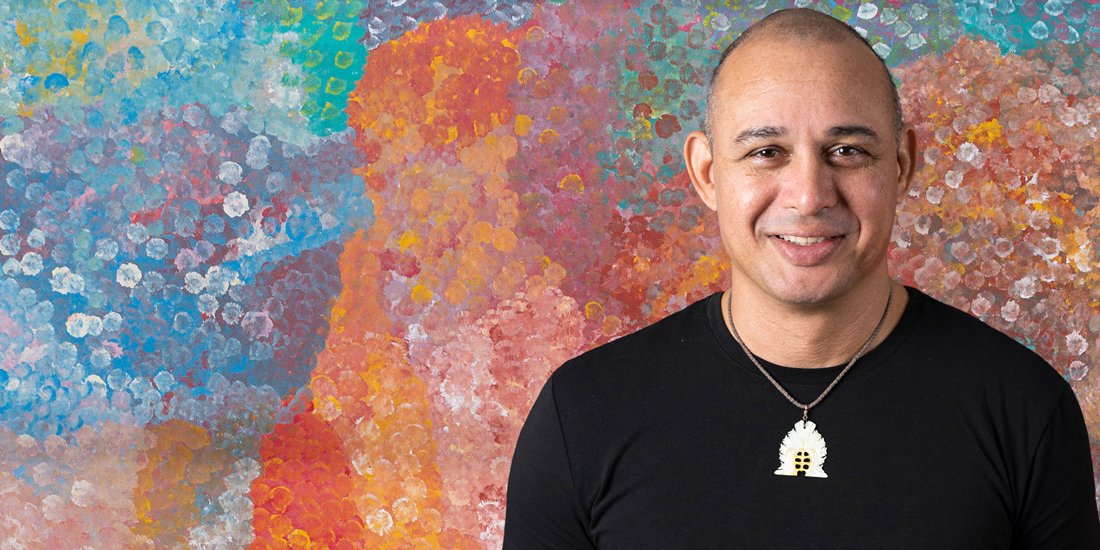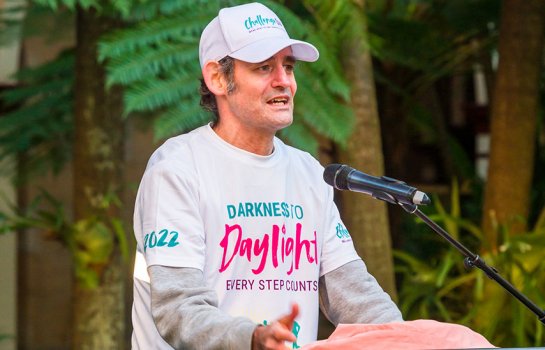Thomas Mayo, author and activist
We have to collectively let go of this burden of a colonial past, and move towards a nation that accepts our Indigenous heritage
Author and activist Thomas Mayo has an incredibly calm and softly spoken demeanour, which is surprising for someone in the middle of a war of words. The dedicated ‘Yes’ vote campaigner for the forthcoming Voice referendum is coming under frequent fire from the ‘No’ side of the debate. Due to cartoons and personal attacks in the media, his days and nights on the road are being made increasingly stressful as he traverses the nation knocking on doors, speaking to commuters at stations and making appearances at town hall events. The father of five children – Shayla, 26, Tiah, 25, Celestino, 23, William, 12, and Ruby, 10, – says he won’t see them, or his wife Melanie, for several more weeks while he tries to “educate the public and explain why the Voice is so important”. “On average I’m back home in Darwin for two nights every six weeks at the moment,” he tells The New Daily. “My family are extremely important to me, but it’s a sacrifice I have to make for the national interest of Australia. “The children don’t see a lot of the awful things that are said about me but they do see some of it, which is upsetting for them. We talk it through often and they know my work is the right thing to do.”
Mayo, a Kaurareg Aboriginal and Kalkalgal, Erubamle Torres Strait Islander man, is the assistant national secretary of the Maritime Union of Australia. As a signatory of the Uluru Statement from the Heart he has been a leading advocate since its inception in 2017, and is a director on the Australians for Indigenous Constitutional Recognition board. Along with Kerry O’Brien he has co-authored The Voice to Parliament Handbook, which has sold more than 50,000 copies. The 46-year-old, who spent his early years playing rugby and working on Darwin’s wharves, says the racism he experienced growing up strongly motivates him to push for change. “I remember walking around Darwin with my mum and dad and my two sisters when bunches of young blokes in utes would yell ‘You black bastards’. “Dad would swear back at them though. He always stood up for us, so maybe that’s where I get it from.”
With a vote on the Indigenous Voice to Parliament only weeks away, Thomas Mayo tells us what the looming referendum means to him.
You’ve become a well-known advocate for people to vote ‘Yes’ for the Voice. Can you explain why?
I’m voting ‘Yes’ because it’s vital for Australia to recognise Indigenous culture in our constitution, and to do it in a way that Indigenous people themselves have invited them to do so in a practical way. This is the Australian way at the end of the day, to give a hand up to Indigenous people and give them a chance to be listened to. We have to collectively let go of this burden of a colonial past, and move towards a nation that accepts our Indigenous heritage. It’s so wrong that the life expectancy for Indigenous people is eight years less and that the suicide rate is twice as high. Proportionately, we are also the most incarcerated people on the planet.
What does a Voice to Parliament mean to you personally, and what significant impact might it have for you?
What drives me fiercely is the practical reason that I know the Voice is key for improvements. More personally and emotively, we are talking about my friends and my family and my communities as an Aboriginal man. I have strived through various ways over the years, such as organising rallies when poor decisions have been made or when there is an injustice, but nothing is working – the gap is widening.
What do you believe will be the main effects of a ‘Yes’ vote for Australia?
We will be able to hold our head up high as a nation in the world. We will no longer be behind other nations who have recognised Indigenous people in their constitutions. It will also save taxpayer dollars by seeing better outcomes for each dollar spent while also saving lives, especially in remote communities. Only good can come from that. If you really listen to the reasons some Indigenous people are saying ‘No’ they are actually reasons to say ‘Yes’, but there is a low level of trust that Indigenous Australians have for processes and matters relating to government, which is understandable. I’ve heard some Indigenous Australians saying they are voting ‘No’ because they find the whole concept insulting because we already have a voice. They mention some of the main Indigenous organisations in this country which are already consulted, but actually these same organisations want the Voice. They want it to drive better policy and to drive direction in funding.
If it fails, how will you feel and what will that mean?
I can’t contemplate failing on this; it would set our country back by many decades. It won’t mean things will just be the same as they were before the referendum. Things will be worse largely because the self-esteem of Indigenous people will be so incredibly damaged. After all, this is simply a modest proposal – we are asking for an advisory voice and to be recognised. We’ve worked so hard for this moment, so if it doesn’t happen there will be a huge impact on our mental health because it will be devastating. In effect, Australia will have officially said ‘No’ to recognising our existence and that we shouldn’t have a fair go or a say. It would be hugely detrimental for Australia to say ‘No’.
How has it been, as an Indigenous Australian, to be subject to a heated national debate such as this?
It’s been tough, but it can’t stop me. It goes to what I know is right and that stark difference between success and failure. The ‘No’ campaign in general has been terribly dishonest in my view; they are saying untrue things like the Voice will have so much power the Australian people will lose something, like their own land in their backyards which is totally false. They are saying there will be legal implications despite ignoring that even the Solicitor-General has stated clearly that the Voice is an advisory body. Luckily there are many people doing a lot of good work to help Australians be informed and to see through the tactics of the ‘No’ campaign.
If you were to advise Parliament on one issue relating to Indigenous Australians, what would it be?
The reason I’m so passionate about the Voice is that it will cover all the main issues and bring up any new ones. We have a lot to tackle, especially regarding housing, justice, education and infrastructure for communities. We need to have a say in all this ourselves. We know that when Indigenous people are listened to by decision makers that the policies and programs get better outcomes.
How do you believe an Indigenous advisory body would make a difference to Australia when we have Indigenous politicians?
It’s so great to see Indigenous politicians in Parliament and that’s something I would like to see more of. But it’s unreliable compared to the Voice because they represent their electorates and their parties. They are not just representing Indigenous people and communities. So there is no certainty. I’ve heard ‘No’ campaigners saying it’s not fair for us to have the Voice when other minority groups don’t get the same chance. But that idea just wouldn’t pass the pub test; no other group has been here for 60,000 years so that’s just ridiculous.
As a father of five, what would be the changes you’d like to see in their lifetime?
I would like to see them live in an Australia that recognises their Indigenous heritage and culture and celebrates it with them. I want them to live in a nation where there is no longer an expectation they will pass away eight years before other Australians. I don’t want them to see Indigenous kids locked up anymore. I want them to be living full and healthy lives. But if we keep doing things the way we are, the gap will widen and the differences will continue into when they are adults and elders. My children understand that this referendum is about doing something different, but different in a way that doesn’t change democracy – it will simply provide greater fairness.
This is part of a special series of interviews by our sibling site The New Daily ahead of the 2023 referendum on the Indigenous Voice. Read the other interviews here.


